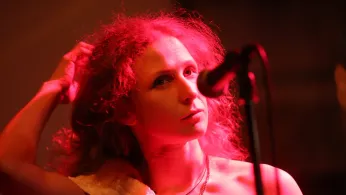
Sep 16
Pussy Riot Members Sentenced in Absentia for Anti-War Activism
READ TIME: 2 MIN.
Pussy Riot, a Russian feminist punk rock collective known for their supoprt of the queer community, their bold performances, and their sharp critiques of Vladimir Putin's regime, has faced another round of legal challenges. Recently, five members of the group were sentenced in absentia by Moscow's Basmanny District Court on charges realted to so-called "false information" about the Russian military. The charges were linked to two key events: a 2022 anti-war music video titled "Mama, Don’t Watch TV," and a 2024 protest at Munich’s Pinakothek der Moderne museum, where they condemned Russia's invasion of Ukraine.
One of the members to be sentenced, Diana Burkot, released a statement in which she recoutned, "Today, a Russian court sentenced me to 8 years in a penal colony under the so-called “law on fakes about the army,” for the music video 'Mama, Don’t Watch TV.' "
Burkot claimed several roles in the video's production, saying, "I am the author of the music, I perform the 'slogans-chants,' I am acting in the video, and I also directed the editing. So, I stand by every single word, and my anti-war stance is clear."
Pussy Riot gained international attention in 2012 for their "punk prayer" protest, titled "Mother of God, exorcise us of Putin," inside Moscow’s Cathedral of Christ the Savior. This performance was seen as a challenge to both the Russian government and the Russian Orthodox Church. The group's activism has often intersected with LGBTQ+ issues, as they have been vocal supporters of LGBTQ+ rights in Russia, a country where such rights are frequently marginalized and suppressed.
The recent sentencing also involves Maria Alyokhina, Taso Pletner, Olga Borisova, and Alina Petrova. The court found them guilty under Part 2 of Article 207.3 of the Russian Criminal Code, which pertains to the dissemination of knowingly false information about the Russian Armed Forces. Maria Alyokhina received the highest sentence of 13 years and 15 days, while Taso Pletner was sentenced to 11 years. The other three members received eight-year sentences each.
Pussy Riot's activism often aligns with queer causes, and their persecution reflects the broader challenges faced by marginalized groups in Russia. The Russian government has increasingly cracked down on dissent, including LGBTQ+ rights, through laws like the "gay propaganda" ban.
The sentencing of Pussy Riot members has drawn international attention, with many viewing it as a politically motivated move to silence dissent. The group's lawyers have stated that the members reject the charges and consider their sentences to be politically driven. This case highlights the growing tensions between Russia and the international community over issues of free speech and human rights.






